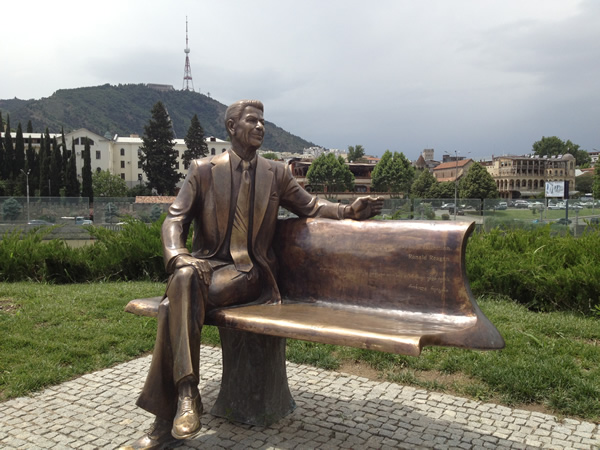More Than Just a Statue: Ronald Reagan’s Legacy in Georgia
Luke Coffey /
Recently, a statue of Ronald Reagan was unveiled in the Georgian capital of Tbilisi. Since I am in Georgia this week speaking at a conference and meeting with Georgian officials, I thought I would take the time to visit it.
The statue sits just above the Kura River, which snakes through Tbilisi, and in the shadow of the presidential palace overlooking the city. It is proudly located in the heart of the city.
In the well-manicured and green public park, a smiling bronze Ronald Reagan is sitting on a bronze bench looking off into the distance in the direction of Russia. He has the look of confidence and satisfaction. Inscribed on the statue is one of Reagan’s more poignant quotes: “Freedom is never more than one generation away from extinction.”
Today, Reagan’s belief in democracy, free markets, a strong defense, and liberty are encapsulated in the reforms taking place in modern Georgia. This is in stark contrast to Georgia’s northern neighbor Russia, where democratic freedoms are in retreat, corruption is endemic, and the future is bleak. The same cracks showing in the Soviet Union a quarter of a century ago are starting to reappear in Vladimir Putin’s Russia.
Thanks to President Mikheil Saakashvili’s Reaganite agenda of liberalizing the economy, cutting bureaucracy, and fighting corruption, economic freedom is alive and well in Georgia today. The 2012 Index of Economic Freedom, published annually by The Heritage Foundation and The Wall Street Journal, ranked Georgia 34th out of 184 countries in terms of economic freedom—a striking improvement from its ranking of 113 in 2003. The new Index places Georgia ahead of 26 European nations, including France, Spain, and Belgium.
Georgia has also made significant progress in tackling corruption. No longer can the president appoint judges, mayors, heads of local governments, university rectors, or heads of regulatory commissions. Transparency International’s Global Corruption Barometer (2010) ranked Georgia first in the world in terms of the decrease in corruption levels.
The statue of Reagan is a reminder to all Georgians of how far they have come since the oppressive days of communism and of how bright their future can be. To the West, the statue is a reminder that the Cold War did not just end—it was won. The people of Georgia were liberated because the ideas of freedom trumped oppression, and the central planning of communism could not compete with economic freedom. In the end, the values, ideas, and vision of Reagan—and his British counterpart, Margaret Thatcher—turned out to be more powerful than any force that NATO could ever field.
I look forward to the day when I can visit Tbilisi and see that Thatcher has also been honored with a statue. She should also be facing northeast and looking over the Caucasus. However, with statues or not, the legacies of Reagan and Thatcher are alive today in Georgia. If Georgia slips back into Russia’s orbit instead of being drawn into the European family of nations, the West will have no one to blame but itself.

